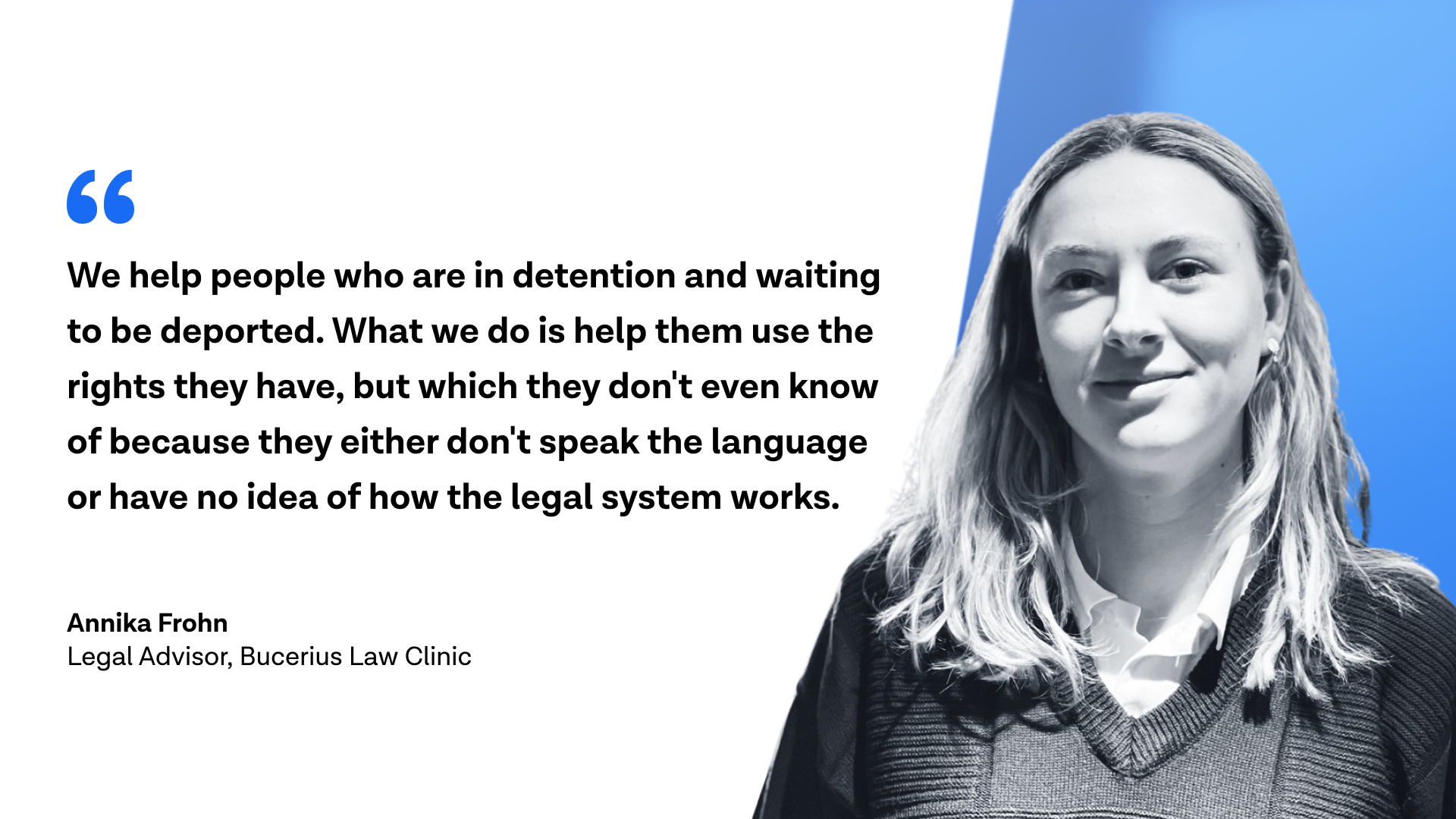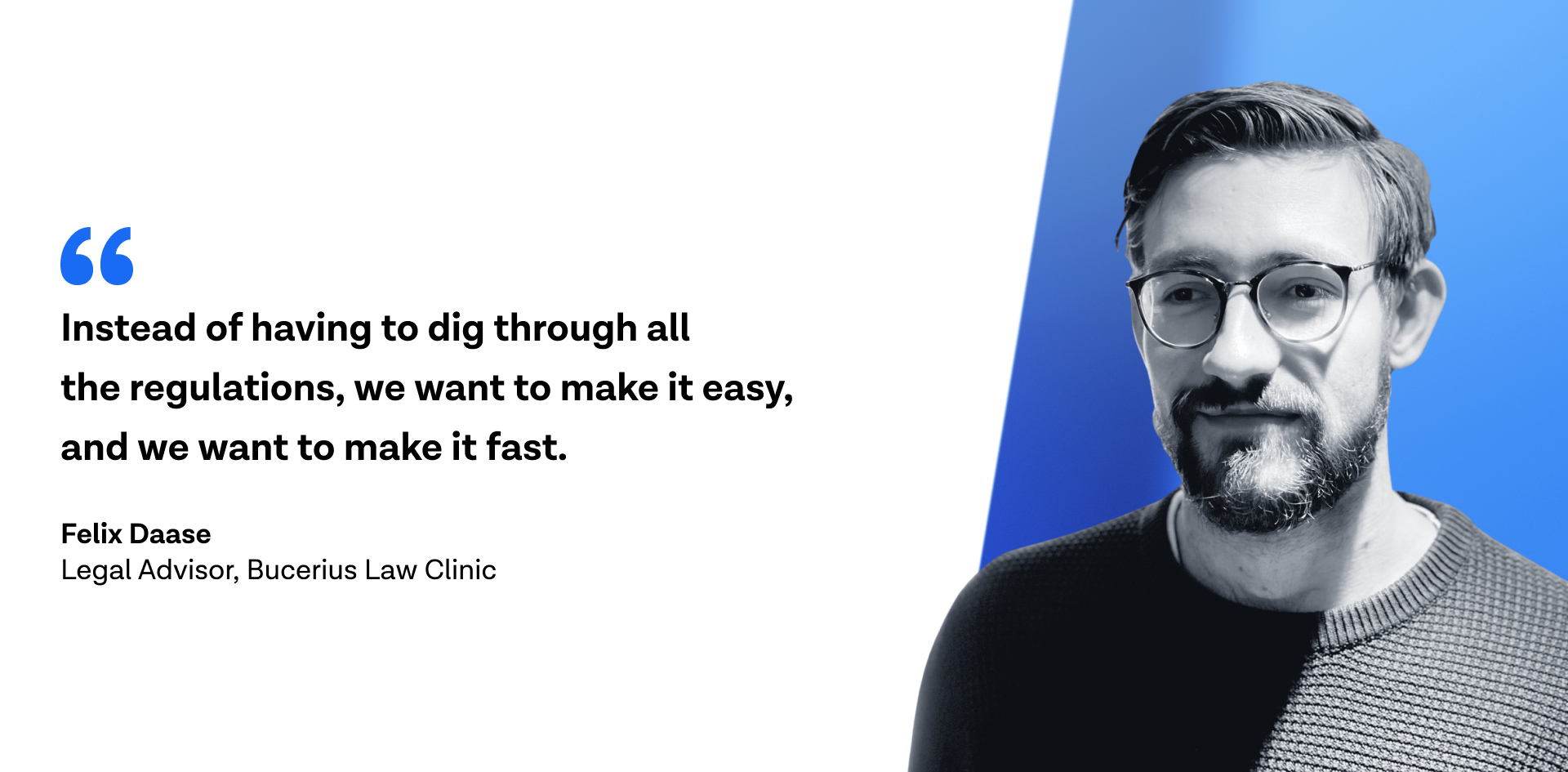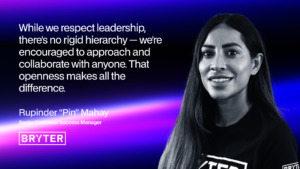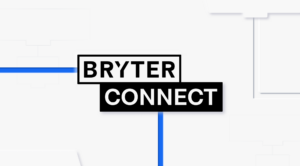The Bucerius Law Clinic is a project led by the Bucerius Law School working closely with the Diakonie Hamburg, where law students provide free legal advice to those with limited access to quality counsel.
The Clinic is a student-led effort under the guidance of local attorneys. Their objective is to help people who are in need of high-quality legal counsel, but who have limited access due to their financial or personal circumstances. Their clients are people who have problems in various areas of the law — from labor to family to landlord and tenant law. Most recently, the Clinic started an immigration law project that necessitated the use of new tools to better serve clients and scale their services.
We spoke with Legal Advisors Annika Frohn and Felix Daase to see how they’re using legal tech to scale their impact and provide services digitally.
The challenge of immigration law
“We help people who are in detention and waiting to be deported. What we do is help them use the rights they have, but which they don’t even know of because they either don’t speak the language or have no idea of how the legal system works.” – Annika Frohn, Legal Advisor, Bucerius Law Clinic.
The immigration law project has a narrow and often-overlooked, but crucial focus. Felix Daase explains this best: “We’re not focused on avoiding deportation. Rather, we advise detainees awaiting deportation on enforcing their basic human rights. By representing those seeking our help in front of the court, we hope to leave a positive mark on German jurisprudence. Through our work, we can prevent unlawful detention and raise awareness of the inhumane treatment that some detainees have to suffer. Our focus is very specific and, at the same time, uncommon: It’s something that is not on the radar of most lawyers.”

Using digital legal tools to empower clinic volunteers
The Clinic needed a more efficient way to empower and inform their volunteers, who might not have field-specific legal education in areas like immigration and detention law. That’s when they turned to BRYTER, where legal operations experts can build their own custom digital solutions without coding or expensive IT contracts.
Using tools the Clinic built with BRYTER, volunteers working across several law clinics can effectively advise on very specific sets of laws and regulations that they would not typically be familiar with.
Having identified a common problem that does not have many solutions, the students at the clinic set out to build a system of tools and information that can be replicated across several law clinics throughout the country.
“To help on a bigger scale, we needed this application. So, our goal is to make this tool available to all other law clinics across Germany.” – Felix Daase, Legal Advisor.
Scaling impact with step-by-step guidance and automation
The law clinic is using BRYTER to build several tools to help facilitate the process of providing legal advice in a scalable way.
The first tool they built using BRYTER is a document automation application that enables the advisor to generate a letter to the court indicating that volunteers from the law clinic are representing the detainee and requesting access to the court file.
They are currently working on automating the rest of the process by creating another self-service app, which will guide advisors by asking questions relevant to the case. Each question depends on the answers to previous questions. This tool empowers student advisors to utilize their general legal knowledge, so they can help without having specific expertise in immigration law.
So instead of spending time researching complicated laws directly, the student only needs to answer specific, required questions using the BRYTER tool. The idea is to guide them step-by-step through the statute and ensure that they do not get lost in the dense law.
Operating faster and more efficiently with digitization
The digital legal pathways The Clinic is building enable advisors to pursue their mission much more quickly and effectively, but also ensure that they do not get lost in the process.
Currently, Felix and Annika are part of a team that focuses on the most difficult part of the process: Understanding the detainee’s file and finding any potential mistakes.
Annika tells us that their focus is currently on creating an application that allows the student advisors to take action as quickly as possible: “It is about saving time, but it’s also about enabling people who would normally not be able to help, to do so by using our BRYTER tool.’’
Felix adds, “Instead of having to dig through all the regulations, we want to make it easy, and we want to make it fast.’’

Felix explained that with more detention facilities being built all over Germany there is bound to be more detainees. “That is one other reason why we need to build this digital product. We could, of course just teach our fellow students the law, but if we want to help on a bigger scale, we need this module and we need to make it available to law clinics across Germany.”
Using BRYTER makes the whole process much more efficient and, on average, cuts down the time it takes to get to an answer by 50%. Using a digital tool rather than a physical checklist means that the logic pathways are automated and The Clinic gets to an answer more quickly. This also leads to another benefit — you cannot go wrong. Once you have the logic built out, it will always go to the same conditional answer. In other words, the scope for human error is minimized, which further optimizes the speed with which the Law Clinic can process clients.
Why the Law Clinic is working with BRYTER
The Law Clinic came to use BRYTER organically, and with a clear use case. After an introduction to the practical side of the relevant laws, the student advisors were left working with a long checklist of questions to establish all the necessary facts. Many of these questions would lead to another question, which lead to another, and so on.
After attempting to simplify the checklist from 50 pages, they got it down to 30. The process was still long, laborious, and confusing. So, they attempted to digitize it using basic questionnaire tools which did not work. Because the nature of this process is conditional, it means that it essentially contains some complex logic.
That is when they came across BRYTER. After a short demo, Felix was able to create a simple model for a tool to digitize this questionnaire. Previously, another team had been working on creating an app for almost a year, but they were not able to get to a functioning solution. After Felix demonstrated his model the Law Clinic, they made the decision to build this application with BRYTER, using the tech for good program offered through BRYTER Open.
A BRYTER future in store for the Bucerius Law Clinic
None of the people building tools at the Bucerius Law Clinic has a background in coding or tech. What they do have is the legal knowledge, which they are able to digitize and deliver at scale using BRYTER’s no-code, drag-and-drop platform.
The complicated part of building these scalable tools with BRYTER is the law itself, not the technology. This only increases the value of creating a tool that allows the Law Clinic (and, in time, other law clinics) to deliver this service in a digital and scalable way. We look forward to seeing what they build next!
If you are a not-for-profit organization and would like access to BRYTER’s no-code app builder, check out our No-Code guide and apply to BRYTER Open, our tech for good program.











